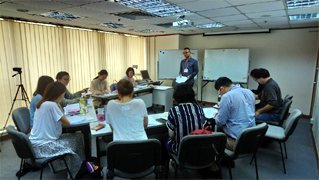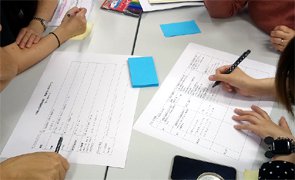The Hong Kong/Macau Japanese-Language Teachers Update Project
The Society of Japanese Language Education Hong Kong
SAITO Makoto
The work of Japanese-Language Specialists who are dispatched to Hong Kong revolves around providing indirect support as “Japanese-Language Chief Advisor,” including by traveling to Japanese-language educational institutions in Macau and Hong Kong; providing support for teachers through training, institution visits, lesson observations and so on; and forming teachers networks, offering teacher consultations and support for learners.

The 2018-19 Intensive Training Program for Japanese-Language Teachers
One of the major duties of Japanese-Language Specialists dispatched to Hong Kong is to serve as lecturers at the yearly “Intensive Training Program for Japanese-Language Teachers (hereinafter the “Training for Teachers).” The Society of Japanese Language Education Hong Kong (hereinafter the “Society”), where I am dispatched, plans and implements this Training for Teachers every year in around October to May. The first half consists of lectures on Japanese-language teaching methods, and the second half of class practice.
At the start of the 2018–19 Training for Teachers, there were 12 participants, with a roughly 50:50 mix of native Japanese-language speakers and non-native speakers. Their motives for taking the training were also varied, including some who were working as Japanese-language teachers wanting to brush-up their skills, some who wanted to become fully-fledged Japanese-language teachers, and some considering it as a side-job who wanted to teach people they know to begin with. In all cases, however, they listened attentively to the lectures each time, and learned together through debates and discussions.
For some time, Japanese-language education in Hong Kong has for the most part been grammar-focused and has relied on an intermediary language (Cantonese, English). However, at this Training for Teachers, participants thought about what it means to become “able to use” a foreign language, and studied methods of lesson design for making it possible to achieve that in classes. In the class practice, they came up with lesson plans based on what they had learned in the lectures and tried putting them into practice. Learners with Japanese-language abilities at levels appropriate for the lessons to be taught in the class practice sessions were recruited, and came along as volunteers to play the role of students. This made the class practice impossible to fake.
When the training participants were surveyed, the results revealed that they came to various “realizations” at an individual level. Is the role of a teacher only to be “a person who teaches?” and what does it mean to study a foreign language? In the course of the dialogue, discussions and class practice at the training, it appears the training participants each began to form an image of what a Japanese-language teacher “looks like.” I will be more than happy if the participants put the things they have learned in this training to use in their careers as teachers in the future.

Workshop in Macau 2019
I give lectures as a facilitator at the workshops and seminars that the Society regularly hosts in Hong Kong, but as a new initiative in 2019, I held a workshop in March for Japanese-language teachers in Macau. Despite this being the first time the workshop had been held, 16 people were kind enough to sign up to participate, more than I had anticipated. There are almost no opportunities for teachers in Macau to brush-up their skills. A few people take part in overseas seminars online, but my workshop participants appeared to really enjoy gathering in one place to learn together while talking to one another, and the results of a survey I took after the workshop were for the most part favorable also.
One surprising thing I heard from Japanese-language teachers in Macau is that many learners who begin taking classes do not carry on after the first term ends, and stop attending. There are various factors behind this, both internal and external, but apparently one of the biggest is that prior to taking classes, these learners have an image of the Japanese language as “not all that difficult to learn,” so when they actually begin trying to learn it, it feels difficult. The local schools and teachers are also using various ideas and making various efforts, and I believe there will also be a lot to learn from the experiences of the pioneers in the field, but from here on I hope that I too can somehow help learners to experience – if even in a small way – the pleasure and sense of satisfaction of learning the Japanese language.
- What We Do Top
- Arts and Cultural Exchange [Culture]
- Japanese-Language Education Overseas [Language]
- Japanese-Language Education Overseas [Language] Top
- Learn Japanese-language
- Teach Japanese-language
- Take Japanese-Language Test
- Know about Japanese-language education abroad
- The Japanese-Language Institute, Urawa
- The Japanese-Language Institute, Kansai
- Japanese-Language Programs for Foreign Specified Skilled Worker Candidates
- Japanese Language Education for Japanese Children Resident Overseas and for the Descendants of Migrants
- Archives
- Japanese Studies and Global Partnerships [Dialogue]
- JF digital collection
- Other Programs / Programs to Commemorate Exchange Year
- Awards and Prizes
- Publications
